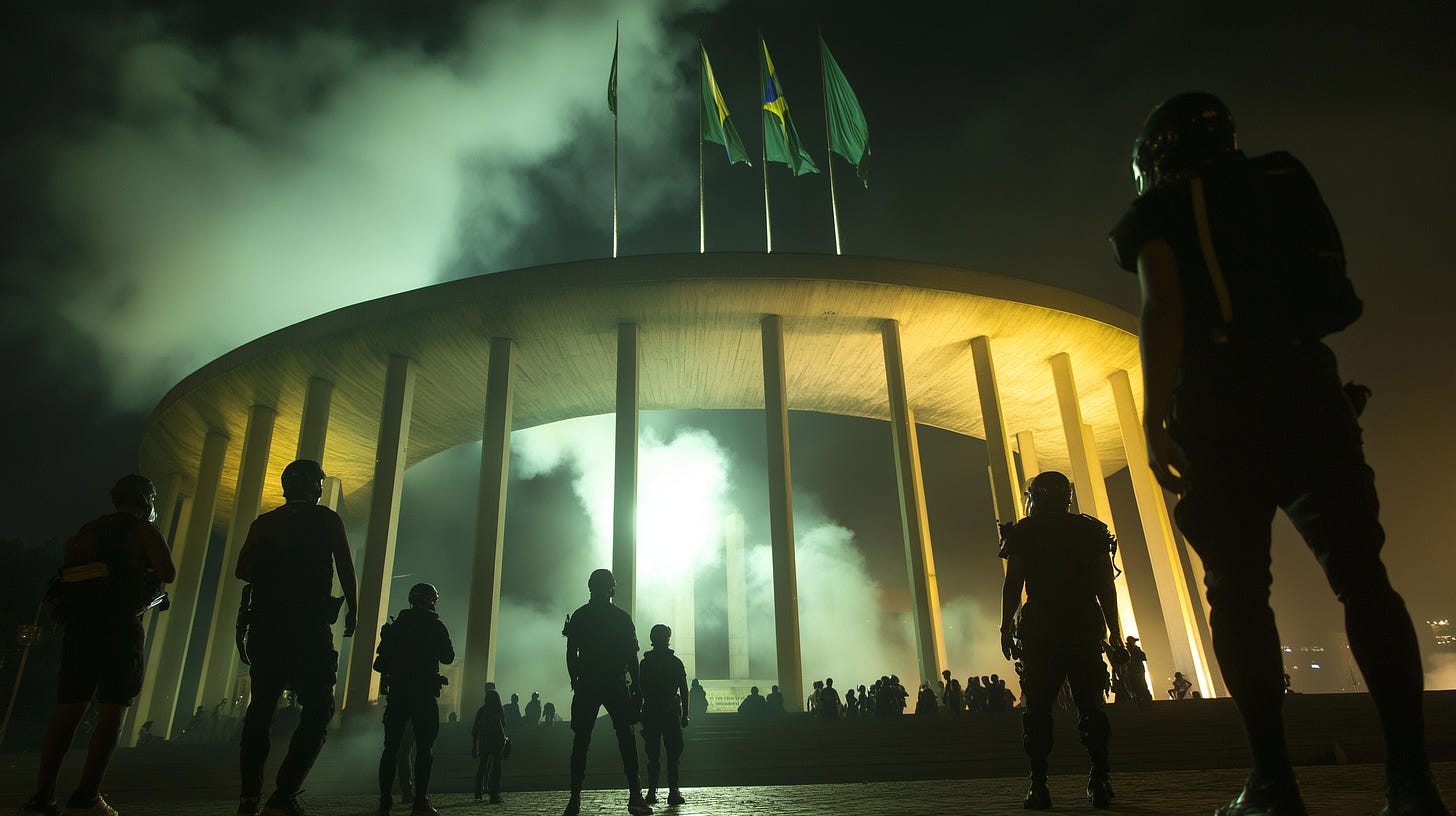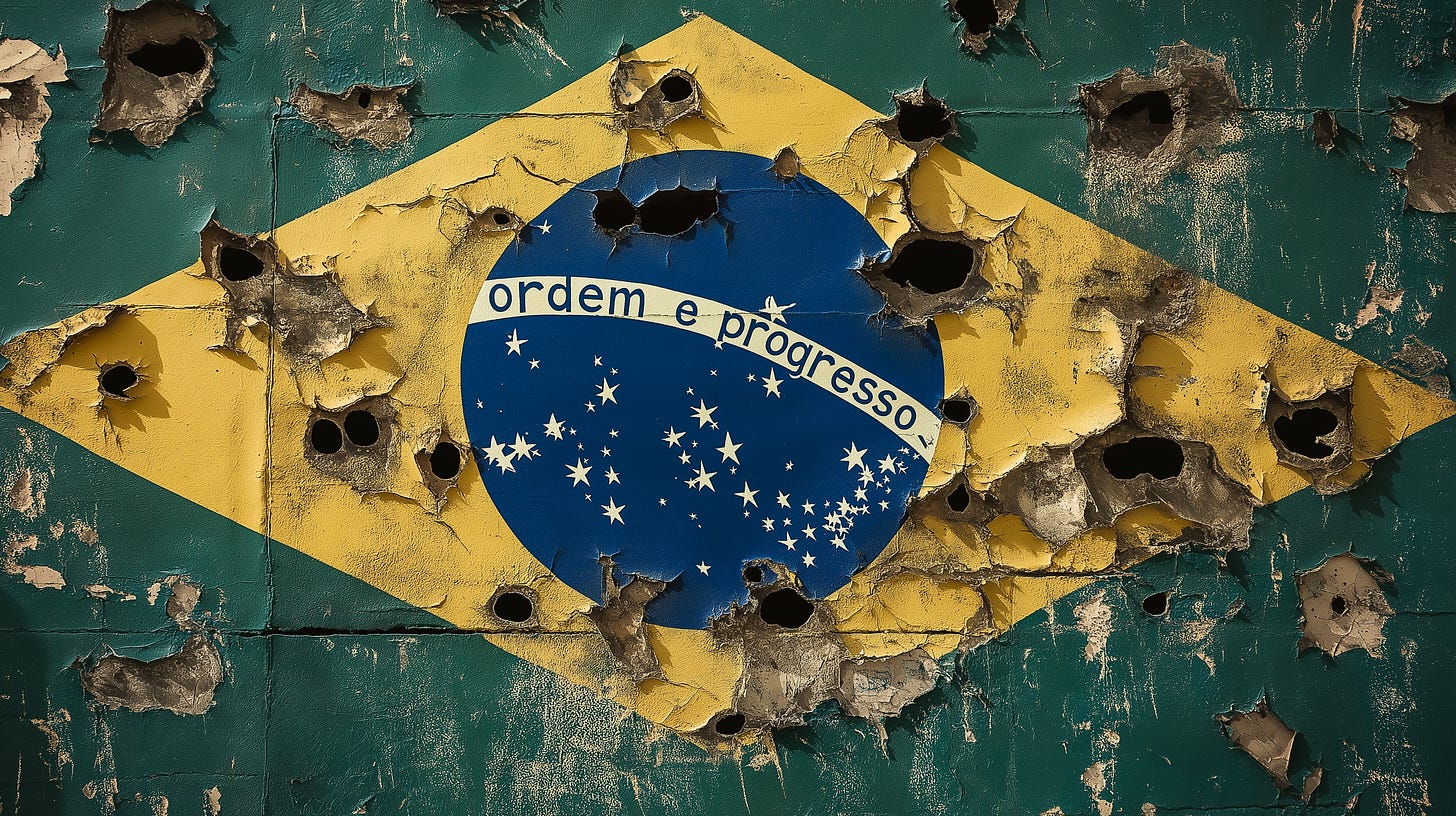How Brazil Narrowly Avoided Catastrophe
Fake news, embezzled jewelry, forged vaccination records, murder by poison, and a failed coup d'état
I usually bring climate related topics to these pages, but this article is a little different. What’s been happening in Brazil is too interesting and strange and important for the little attention it is getting elsewhere, so I couldn’t not write about it. Brazil has outsized importance in climate matters, and what happens there politically is relevant to climate, as I’ve argued before.
My mother jokes that her first words after giving birth were to lament that her baby boy was brought into the world under General Geisel’s rule—potentially dangerous words at a time when the military regime was notorious for torturing political dissenters. I only tell this story to make the point that democratic institutions in Brazil are younger than I am—and I’m not that old. In 2022, just a few decades after democracy was restored, Brazil’s institutions held firm as voters denied a second term to an unfit president with authoritarian tendencies, electing instead a seasoned center-left leader committed to restoring normalcy.
The similarities with a certain other large country in the Americas don’t stop there. After weeks of shadowy attempts to overturn the results of the election, the defeated president, refusing to concede, skipped his opponent’s inauguration by jumping on a plane to Florida and denying the country of an ordered transfer of power. Supporters of the outgoing president stormed the seat of the federal government, vandalizing historical buildings to the sound of loud, baseless claims of election fraud. All this happened in public view, so it is more or less old news.
What wasn’t clear until now was how close Brazilian democracy came to unravelling in quite a spectacular way.
This past week, federal investigators recommended criminal charges against former President Jair Bolsonaro, several of his cabinet ministers, and top military leaders. The nearly 900-page report from the Federal Police (Brazil’s FBI), unsealed yesterday, reveals a shocking conspiracy to stage a coup on December 15, 2022, just days before President Lula’s inauguration. The scheme went far beyond merely overturning the election results; it included an elaborate operation to assassinate the President-elect, the Vice-President-elect, and a Supreme Court Justice who also served as Chief Judge of the Electoral Court1. Bolsonaro and his allies sought to create widespread chaos by inciting riots and detonating bombs in the capital Brasília. The unrest was designed to justify a military intervention to restore order, giving Bolsonaro an opening to remain in power by calling new elections after eliminating Lula and dismantling judicial oversight.
Fake News
Since being elected President in 2018, Bolsonaro and his allies have been under judicial scrutiny for a scheme to orchestrate the spread of disinformation using WhatsApp groups—ubiquitous in Brazil—to attack political opponents, the electoral system, and the judiciary. Bolsonaro himself was caught crossing the line in the middle of his re-election campaign. In his capacity as head of state, he called a meeting with foreign ambassadors to raise doubts about the legitimacy of elections in Brazil and the security of voting machines, unfounded claims debunked by his own administration2.
Initially dubbed the “fake news inquiry,” the investigation was ordered by Supreme Court Justice Alexandre de Moraes (of Elon Musk fame) whose role in the inquiry led to open hostility3 with the former President and secured him a top spot in the assassination list.
After Bolsonaro ultimately left the presidency, the Supreme Court ruled that he had abused his political power in the meeting with foreign ambassadors, barring him from running for office until 2030. Moraes didn’t stop there4 and soon expanded the inquiry far beyond online disinformation into two other fronts, both linked to Bolsonaro’s sudden departure from the country three days before he was due to hand over the presidency to Lula.
Jewelry & Vaccine Passports
At the height of the COVID-19 pandemic, Bolsonaro was infamous for his anti-vaccination stance, and it is plausible that his deliberate foot-dragging delayed the rollout of vaccines in Brazil. Whether or not he took the COVID vaccine has been a long and heated national debate, and the answer is not known. However, the probe revealed that Bolsonaro ordered the falsification of vaccination records for himself and his family prior to travelling to the U.S. at the end of his mandate in 2022. Presumably, he was expecting to have to stay out of the country for a little while, perhaps to ride out the post-coup societal convulsion, and might need to travel to countries where proof of vaccination was still required. Of all Bolsonaro’s legal troubles, this one seems the easiest to avoid (just take the damn vaccine!) but it is deeply embarrassing for Brazil’s international standing, raising questions about whether a sitting president knowingly presented forged documents to enter the United States.
The expanded fake news inquiry also revealed that in 2021, a diplomatic delegation led by Bolsonaro had returned from Saudi Arabia carrying $1.5 million in jewelry gifted by the Saudi government. Luxury gifts to heads of state are typically incorporated into the official presidential collection, but Bolsonaro decided to keep them for himself. Some of the items were later found to have been sold in the United States by one of his aides, who surreptitiously brought the cash back to Brazil. The Federal Police believes that Bolsonaro intended to use the proceeds from selling the Saudi jewelry to fund his self-imposed exile, no doubt before returning in triumph to re-take the presidency and save the country from collapse.
A Military Coup that Wasn’t
By far the most serious allegation against Bolsonaro is an attempted coup d’état where he, cabinet ministers, and top generals conspired in every feasible way to try and keep him in power after losing the election.
The Federal Police uncovered a plot involving bombings at Brasília International Airport and the creation of a military emergency cabinet to oversee the ensuing chaos. By far the most disturbing part of the scheme describes the assassination of top officials by special forces in chilling detail:
President-elect Lula would be poisoned or attacked with chemicals to cause fatal organ failure.
Vice-President-elect Geraldo Alckmin would also be executed.
Supreme Court Justice Moraes would be targeted by a team carrying, among other weapons, machine guns and a grenade launcher. The assassins were in position on December 15 but were foiled by a last-minute change in Moraes’s schedule and Bolsonaro’s apparent hesitation.
Astonishingly, the former president’s lawyers have not come forward to deny the existence of the scheme and have even confirmed parts of it, such as serious consideration given to declaring state of siege in the entire country after the election. Instead, his supporters claim that there were merely preparations, but no execution—a brazenly bold line of defense, given the ample evidence outlined in the report.
What Comes Next
Bolsonaro will surely need defend himself before the Supreme Court5 next year. Few are betting against a conviction, so he is more likely than not to end up in prison before the end of 2025 unless he manages to flee the country.
Despite the alarming sequence of events outlined by the Federal Police showing how close Brazil came to the brink, it looks like the country’s institutions have so far been able to accomplish something the United States has completely failed at: deal effectively with an attempted coup.
I feel less certain about what the next few years have in store for Brazil, now that Donald Trump’s re-election brought new hope to far-right movements worldwide. Bolsonaro is already planning his own triumphant comeback. Despite being barred from running for office, he intends to register his candidacy for president in 2026 even from prison. What will happen at that point is anyone’s guess. Much like Trump in the U.S., Bolsonaro has a cult following capable of ushering him back into high office if the criminal case takes a wrong turn. The chances of that are probably slimmer than Trump’s, given how quickly Brazil’s Supreme Court is determined to wrap things up before the election year.
Unfortunately, reasonable questions are being raised about a possible conflict with Moraes being both the judge and victim in the case. It appears that the technicalities in Brazilian law are on the Justice’s side, but more than technicalities are needed here. If Bolsonaro is imprisoned, it is important that a majority of voters believe that the conviction was legitimate. Out of an abundance of caution, the right thing for Moraes to do is to recuse himself from the case to avoid any air of impropriety.
Lastly, Lula is already the oldest Brazilian president and will be 81 in 2026 when he could be seeking another term6. His waning popularity and incredibly tight margin of victory against Bolsonaro should be a wake-up call. We have seen this movie before in the United States. Lula’s personal ambition—and his conviction that only he can beat Bolsonaro—might well pave the way for another military regime in Brazil.
The Brazilian Electoral Court (Tribunal Superior Eleitoral, or TSE) is the federal body responsible for administering elections in Brazil. It oversees the entire electoral process, including voter registration, election logistics, and the certification of results.
The voting system in Brazil is not without faults, but it is a point of pride for Brazilians and in many ways it is a model for other modern democracies. Voting is highly accessible by all and fully digital. Over 150 million votes are cast within the space of ten hours in a single day (always a Sunday) across four time zones on secure voting machines that reach even the remotest corners of the Amazon jungle. Official results are certified a few hours after polls close. And, as encoded in the constitution, voting is not exactly a right—it is a civic duty.
For years, Bolsonaro has been at odds with the Supreme Court, and with Moraes in particular. In 2021, the former president called him a “scumbag” in a rally attended by millions of his supporters and vowed to not comply with the Court’s decisions. In the same rally he also said he would never go to jail—a statement that might not age very well.
Brazilian Supreme Court Justices yield immense political and judicial power. The Supreme Court (Supremo Tribunal Federal, or STF) frequently jockeys for power with Congress and the Executive, and Justices sometimes issue individual rulings on important national matters. That is a big institutional problem in Brazil. President Lula himself spent time in jail, and was later cleared of charges, due to the whims of the Supreme Court in a changing political landscape. STF’s overreach might even be an impediment to successfully convicting Bolsonaro under the criminal charges that are surely to come. The former President’s defense argues, not without reason, that Moraes is a victim of the alleged crime and therefore cannot oversee the matter.
In Brazil, presidents and other politicians have “privileged forum” and face trials before the Supreme Court.
It would be Lula’s fourth(!) term. In Brazil, presidents can serve a maximum of two consecutive terms, but there’s no limit to how many terms they can serve in total.






